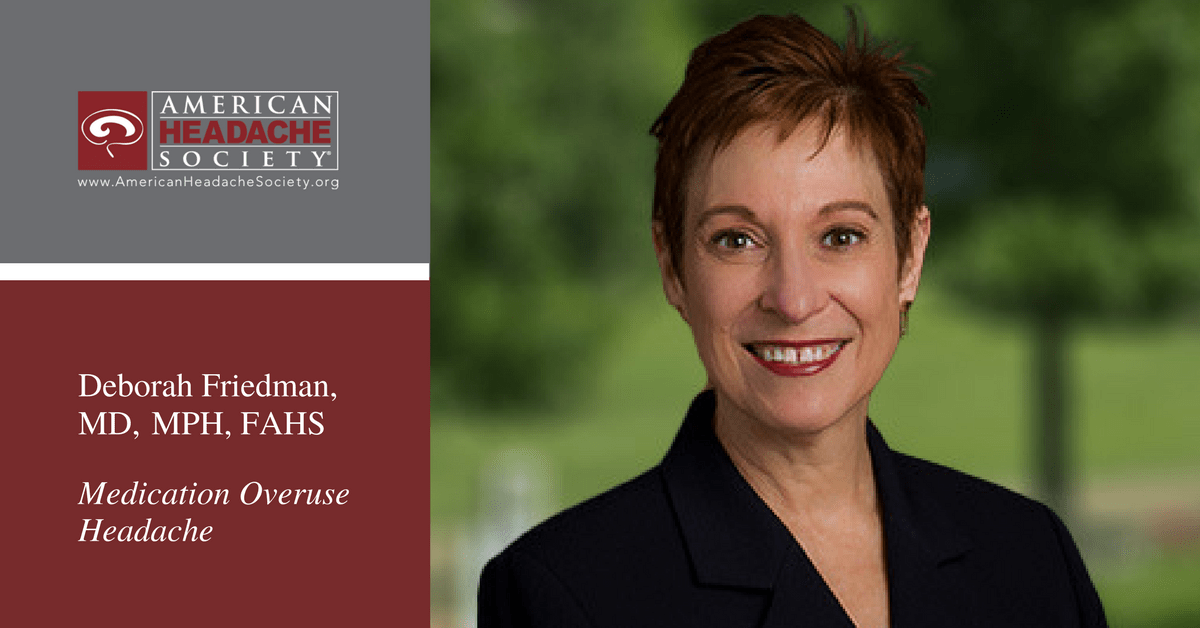
Medication Overuse Headache: Q&A with Deborah Friedman, MD, MPH, FAHS
Medication overuse headache is a well-known association with chronic headache disorders including chronic migraine. Dr. Friedman offers guidance on how it can be treated
Deborah Friedman, M.D., M.P.H., F.A.H.S. is a Professor in the Department of Neurology and Neurotherapeutics and the Department of Ophthalmology at the University of Texas – Southwestern. She recently spoke with the American Headache Society about how to identify medication overuse headache, and what steps doctors and patients can take to prevent its onset.

What are the characteristics of medication overuse headache (MOH)?
Medication overuse headache actually has a definition from the International Classification of Headache Disorders as a pre-existing headache that has worsened with the use of acute medications, or symptomatic medications, that are taken on a specified number of days per month, for at least three months.
What is considered “medication overuse”?
Medication overuse is defined by the number of symptomatic medications taken by a factor of treatment days per month. So for patients who are taking simple analgesics like acetaminophen or naproxen or ibuprofen, it’s 15 days out of the month for at least three months. For patients who are taking combination medications, it’s 10 days per month.
Do patients need to stop taking the medication that is causing their MOH completely in order to stop its progression?
First, we should start thinking about MOH when patients need to use their acute medications more than two or three days per week — that’s the first red flag. I also consider it when patients tell me that they can tell when their acute medication wears off. Often, if we can get people back to the state where they’re only using acute medication once or twice a week, they do okay. Sometimes, initially, we have to just completely take people off the medications. That can be a tough road depending on what they’re overusing.
Is the withdrawal process the same for everyone?
It depends on what they are overusing. It tends to be easier to get off non-steroidals (NSAIDs) and it tends to be easier to get off triptans. Getting off of combination products can be very difficult, and getting off of medications like opioids or Butalbital can be extremely difficult. A lot of times we’ll use bridge therapy to try to get people through those first several days, because those are likely to be agonizing. Sometimes I’ll even put patients in the hospital and cover them with other therapies to keep their pain under control while we’re taking them off their acute medications.
How can headache professionals prevent MOH?
I would recommend warning the patient that if their headaches get worse, to the point where they find themselves taking acute medications more than two or three days a week, it’s a red flag that maybe they either need to be on prevention, or that they need to have their preventive medication adjusted. If nobody asks the patient about their use of over-the-counter medications, and no one specifically asks the patient about how often they are actually taking their as-needed medications, then it’s really easy to be misled and erroneously think that everything is just fine. It’s really important to ask the patient specifically: What are they taking, even over the counter? How often are they taking it? How much are they taking?
What should physicians keep in mind when treating MOH?
Medication overuse is very common. For those of us who see patients who have real, frequent migraines, at least half of them are overusing symptomatic medications. It’s not because they’re a bad person, and it’s not because they were misguided. They were just trying to get relief for their headaches, or in some cases, they were following their provider’s instructions. Some physicians who are not aware of medication overuse headache will actually instruct the patient to take these medications every day if they need them every day. It gets the patient into trouble, but it wasn’t their fault. Just an awareness of the problem is, I think, really a very important part of the whole clinical picture.
Deborah Friedman, M.D., M.P.H., F.A.H.S. is a Board Member of the American Headache Society, a professional society for doctors and other healthcare workers who specialize in studying and treating headache and migraine. The Society’s objectives are to promote the exchange of information and ideas concerning the causes and treatments of headache and related painful disorders, and to share and advance the work of its members. Learn more about the American Headache Society’s work and find out how you can become a member today.


